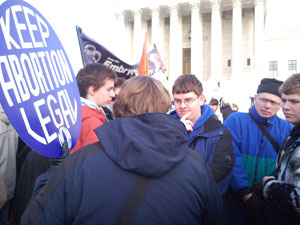“In law school we had started to discuss that problem and many of us said, ‘Well, when it goes before the Supreme Court, what they will do, these nine learned men, they will take a look at the importance of protecting the citizenship of our country, and therefore protecting the unborn,’” he said.
The archbishop said the law students anticipated the court would “guarantee every citizen its life, liberty and pursuit of happiness.”
He continued, “And that order was given because life is fundamental. You can’t talk about liberty, you certainly can’t talk about pursuing happiness if you don’t have life. But that life was denied. Certainly these wise men would render a decision, in almost a Solomon-type of approach, that would recognize the life of the unborn.”
Instead, the court rendered a 7-2 decision making abortion legal.
Value of human life diminished
Noting that Roe v. Wade was “one of the worst decisions ever issued in the history of the Supreme Court,” Archbishop Listecki likened it to the 1857 Dred Scott decision that maintained slavery was legal.
“How could someone look at a breathing human being standing before them and deny the reality that this is a man with all the inalienable rights that God gives, not necessarily even the nation, but the nation affirms inalienable rights, and say, ‘No, this is a piece of property’?” the archbishop said.
In Roe v. Wade, the unborn child in the womb is viewed as a piece of property rather than a “distinct human being,” according to Archbishop Listecki.
“And we suffer consequences because of that. In my sense, the diminishment of the value of life has occurred because of that. Our understanding, literally, of looking at that human life, and valuing it in a very specific way – every other aspect of our life from the aspect of poverty all through the aspects of natural death – has been diminished because we don’t value life from its very beginning,” he said. “We don’t value life the way God intends us to.”
Archbishop Listecki recalled a 1974 pro-life rally to which he had accompanied junior high students from the parish at which he was serving. When he saw how few clergy were participating in the rally, he lamented to an officer of the Salvation Army, “Where are they? Where are they?”
The archbishop continued, “The officer said to me, ‘Don’t worry, Father. Just remember one thing: We’re doing the right thing. We’re doing the right thing. And the right thing is what we’re witnessing to, and the right thing and the truth will win out. So hold your head high and march proud and hold your head up high and those behind us will champion the cause – even the few that are there.’ So we marched.”

Cause for hope
The archbishop said that through the ‘70s and ‘80s, there were those who maintained their resolve on behalf of the unborn.
“There were individuals who proclaimed the Gospel of Life in the face of this developing culture of death,” he said. “And we’re the legacy today of all those who stood up and championed, who placed in the face of our society, the aspect of the unborn, respect for life and its dignity.”
Noting the examples of Pope John Paul II and Mother Teresa, Archbishop Listecki said that the echoes of “champions of life” are being heard.
“Because of it, we’re in a position of what suddenly looked to be bleak has now turned into hope, and I want you to hold on to that. Hope,” he said.
The archbishop said that part of that hope is found in science and technology, including the understanding of DNA, not present in 1973.
“How does one take a life when it sees very clearly a form of a child in the womb? How does one go forward, if you were going to make a case now before the Supreme Court, that this is not human life?” he said. “Science would be on the side of saying, ‘That’s a lie! It is (a human life).’”
Archbishop Listecki said true hope is found in the Gospel.
“As people of faith … we can never lose our sense of hope and direction because it is God who verifies that in us. Not the world,” he said. “The success is not determined by our society. Our success is determined upon our faithfulness to our God.”
‘Manifest greatest weapon’
The archbishop said that people needed to “manifest what is the greatest weapon in our spiritual arsenal of our faith.”
“You must manifest the love of Christ toward those you encounter. There is no room in the culture of life for violence. There is no room in the culture of life for attitudes that demean others. There is only one objective for people of faith,” Archbishop Listecki said, pointing to the cross. “There! The manifestation of his love. The greatest mandate Jesus has proclaimed in the Gospel is love your enemy. Do good to those who would harm you.”
In expressing his gratitude to those who participated in the Mass, the archbishop promised his support, prayer and leadership in protecting the sanctity of life.
“It’s a mandate for us to live the Gospel fully and correctly; it’s a mandate for us to love in this society; it’s a mandate for us to help our brothers and sisters who are in need of the right direction that leads them to God,” he said.
